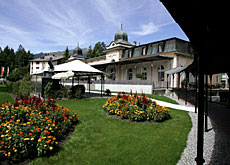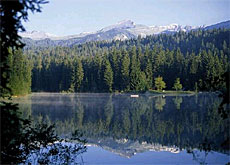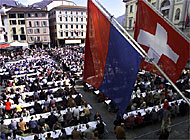Flims gears up for parliamentary invasion

Standing on the indoor tennis courts of the Park Hotel Waldhaus in Flims, it’s hard to imagine you’re looking at a future seat of the Swiss parliament.
The parliament building in Bern needs renovating, so 246 Swiss politicians require a temporary home for the three-week autumn session in 2006.
As makeshift parliament buildings go, they don’t come much better than the award-winning Park Hotel Waldhaus in the Romansh-speaking part of the country.
The five-star hotel boasts 400 square metres of space, six restaurants, 13 meeting rooms, hundreds of beds, and there are other hotels close by to accommodate any overflow.
It is also set in acres of parkland, which is a welcome change from the two previous occasions when parliament convened outside Bern and chose to meet in cities.
Come 2006, these serene environs will be swarming with media and packed with the tools of governance – hundreds of laptops, a parliamentary library and stacks of files – along with the people who use them daily.
Rugged beauty
It will be the first time in the country’s history that the small Romansh-speaking community in eastern Switzerland has hosted the federal parliament.
Many consider the host canton, Graubünden, the most beautiful part of Switzerland for its untouched landscape and quaint villages.
The Engadine Valley stretches from lakes Sils and Silvanplana – a Mecca for windsurfers – to the resort of Scuol, known for its thermal baths.
The turquoise waters of Flims’ own Lake Cauma are another popular draw.
The canton is also home to two of the country’s leading ski resorts, St Moritz and Davos, while just east of Flims, a national park teems with wildlife.
Belinda Signorell, tourism spokeswoman for the Flims-Laax-Falera region, says she intends to show parliamentarians the best that the area has to offer – but that’s not all she has in mind.
“[The visit] gives us the chance to show how difficult it is to maintain the Romansh language,” she said.
Signorell admits that even she has some trouble understanding all five dialects of her mother tongue, which is spoken by less than 0.46 per cent of Swiss – or 35,000 people.
She hopes to emphasise the importance of supporting the Romansh language – one of the four national languages – which benefits from a SFr4.5 million ($3.7 million) federal subsidy.
Historic
Previous sessions of parliament outside the capital, Bern, have been held in French-speaking Geneva (1993) and Italian-speaking Lugano (2001).
This time around, parliamentarians say they want to focus on the challenges faced by a rural mountain area.
Signorell admits that the mountains are beautiful to visit, but says they offer limited job opportunities.
“The challenge for many is the [slim] variety of jobs and the difficulty of improving your life up here,” she said.
“We will show them the tiniest, loneliest villages, how we work every day, and how we live in the mountains. And we plan to take them all over the valley.”
“But at the same time, we will be able to show them our beautiful landscape, our peaceful silence and our fresh air,” she added.
Not city living
Despite being out in the wilds of Graubünden, politicians can rest assured that they won’t be roughing it.
In August the Park Hotel Waldhaus was named Hotel of the Year by the GaultMillau travel guide, which praised its tradition of three-hour gourmet dinners and its SFr16 million indoor-outdoor pool and spa.
Nestled amid three top ski resorts on 200 hectares of parkland, it is situated within a ten-minute walk of local shops and restaurants.
And the hotel has experience of big conventions: they account for half the hotel’s 30,000 guests each year.
Even so, hotel conventions manager Rosa Ilmer-Walser says hosting parliament will be a major challenge.
Preparing Flims for the parliamentary session in two years’ time is expected to cost SFr1.7 million.
“We’ll start building work several weeks in advance but we don’t know at this point how they will manage security,” said Ilmer-Walser.
But despite her extra workload, Ilmer-Walser is delighted parliament is coming to Flims.
“This is an honour, not just for our hotel but for the whole area,” she added. “Romansh-speakers are a small group and they have a hard time being understood. It’s nice for the government to tell people they’re important.”
swissinfo, Elizabeth Meen in Flims
Flims will host the autumn session of parliament in 2006
Flims-Laax-Falera, “The Alpine Arena”, is the country’s largest interconnected ski area.
Nearby are the idyllic Lake Cauma, the Rhein Gorge known as the “Little Swiss Grand Canyon”, and Parc la Mutte, a megalithic site.
“Crap” is Romansh for “mountain peak”, inspiring the occasional “Flims is Crap” T-shirt.
Parliament is moving lock, stock and barrel to Romansh-speaking Flims in 2006, the third time the assembly has convened outside Bern.
Temporary relocation will cost SFr1.7 million ($1.4 million). It is hoped the move will boost the region and national cohesion.
Flims offers stunning views of the southern Alps all the way to Italy.

In compliance with the JTI standards
More: SWI swissinfo.ch certified by the Journalism Trust Initiative



You can find an overview of ongoing debates with our journalists here. Please join us!
If you want to start a conversation about a topic raised in this article or want to report factual errors, email us at english@swissinfo.ch.